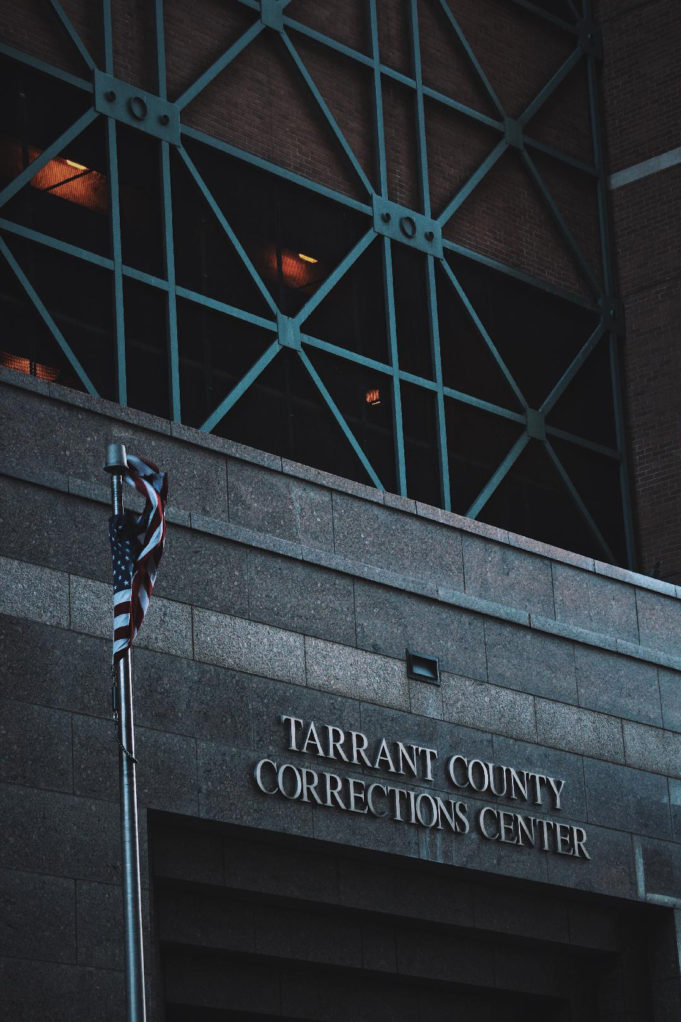When Jarrett Adams learned about the 2020 arrest of Chasity Congious and the subsequent loss of her newborn child in Tarrant County Jail, the Chicago civil rights attorney couldn’t sleep for days on end.
Congious has schizophrenia, mental health disorders, and mild mental retardation, Adams said, based on documented information, and Fort Worth police officers should have treated the crisis that led to her arrest as a medical problem, not a crime.
Adams spent the last 12 months researching the incidents that led to Congious’ arrest by Fort Worth police officer David Nguyen, her detention in Tarrant County Jail, the institution presided over by Sheriff Bill Waybourn, and the death of Congious’ newborn daughter while under the supervision of two jailers. Adams claims Fort Worth police have sought to block his requests for documents related to the expectant mother’s arrest, so he recently filed suit in the Fort Worth division of U.S. District Court. Through discovery procedures, Adams and attorneys with two firms who co-filed the expansive lawsuit will compel the Fort Worth police, the City of Fort Worth, Tarrant County, and the Tarrant County Sheriff’s Department to release evidence related to the case that Adams’ legal team will use to build their case for a trial early next year.
Adams, who spoke with me from one of three offices he fields across the United States, said the three firms have allocated substantial resources into this case and that the team plans to see the civil suit through no matter how long it lasts. He believes national attention from the litigation may bring the U.S. Department of Justice (DOJ) to investigate the county jail, Tarrant County Jail, that saw 17 custodial deaths in 2020, a shockingly high number compared to other, similarly sized facilities.
ABC News reported that cities pay out around $300 million a year to settle lawsuits that involve police misconduct and brutality. Those payouts come from taxpayers and not the police departments that are at fault. Police reform advocates are increasingly calling for police departments or their well-monied unions to foot those bills instead of the public.
A spokesperson for the city said they are aware of the lawsuit but that city policy prohibits discussions or comments on pending litigation. Fort Worth police’s media team also did not reply to requests for comment. The sheriff’s department also declined to comment on the lawsuit but said that staffers at John Peter Smith Hospital (JPS) are on-site 24/7 inside Tarrant County Jail and that they provide medical care for inmates and pregnant inmates.
“Our hope is this,” Adams said. “We are not coming down to destroy Tarrant County Jail. What we are trying to do is to improve the conditions for the citizens who come through that jail.”
******
I referred to court documents and Adams’ extensive interviews with the Congious family for the following timeline.
In early 2020, Congious was experiencing a mental health crisis at her home. She was four months pregnant, and her family feared for the unborn child’s life. Family members called Fort Worth police and requested that officers take Congious to the psychiatric ward of JPS for involuntary commitment.
“Despite the family’s request for medical assistance, [Officer] Nguyen arrested Chasity,” reads part of Adams’ legal complaint. Her “arrest was made without a warrant. Immediately before she was arrested by [Officer] Nguyen, [she] was not violating any laws, rules, or ordinances. There was no probable cause or justification for the arrest of Chasity Congious on Jan. 15, 2020.”
The document goes on to allege that Officer Nguyen falsified a police report to justify the arrest. Adams said Congious’ family rebukes police allegations that she assaulted her family members before her arrest.
Upon arrival at Tarrant County Jail, Adams says, Magistrate Judge Jenny Pearce failed in her duties to comply with the Sandra Bland Act — the 2017 Texas law that mandates that certain steps are taken to divert defendants with mental health problems to treatment centers — and placed Congious in jail on a probation hold that denied the expectant mother the option of posting bail for release.
During detention, Congious refused to take medications for schizophrenia, bipolar disorder, and pregnancy. By late January, mental health professionals began noting that she was becoming nonverbal. Then she began refusing food. By April and toward the end of her pregnancy, Congious would stand and stare at her jail cell door for hours on end. At no point during her five months in jail did she have a court hearing.
Adams’ complaint alleges that medical staff had notified jailers that Congious did not have the mental capacity to know when she went into contractions. When the pregnant mother did go into labor, the complaint reads, she did so alone in an isolation cell.
Adams said the idea that jailers didn’t hear Congious’ tormented screams as she went through labor and delivered a newborn defies belief.
When jailers entered her room in mid-May for a routine check, they found blood everywhere. Her newborn daughter, named Z.C.H. in court documents, was strangled from an umbilical cord wrapped around her neck. Congious was bleeding out from a severe perineal tear. Both mother and newborn were rushed to Cook Children’s Hospital where Z.C.H. was pronounced dead. Had Congious been allowed to give birth in a hospital, Adams said, Z.C.H. would be alive and well today.
Sheriff’s department staffers allegedly denied Congious the right to hold her braindead child before the baby girl was taken off life support.
“The mom made a request that she be given an opportunity to go to the funeral,” Adams said. “They denied that request. It was within their discretion to allow the mother to attend the funeral.”
In mid-June, the local district attorney’s office voluntarily dismissed the false charges that Officer Nguyen levied against Congious, and she was sent to JPS for inpatient treatment for a few months before being released to the care of her mother. There is no word on whether Nguyen has been disciplined for his false charges.
*****
Tarrant County Jail has failed inspections by the Texas Commission on Jail Standards (TCJS) three of the last seven years. Population deaths at the county jail remain disproportionately high — six (2019), 17 (2020), 13 (2021) — compared to neighboring counties. According to the Dallas Morning News, Tarrant’s jail averages around 3.5 times as many detainee deaths as Dallas’ county jail. Over the past five years, Tarrant County Jail deaths have far exceeded those at nearby Denton and Collin county jails, the newspaper said, based on county figures.
In August, our news magazine read through nearly 400 pages of complaints that were recently filed by members of Tarrant County’s jail population (“ Treated ‘Like Animals,’ ” Aug. 2021). The first-hand accounts described one detainee who slit his wrists to escape sexual harassment by a jailer. Another member of the jail population said she prayed for death during the worst periods of her battle with COVID-19. One letter described beatings by jail guards that left one man begging to not be returned to Tarrant’s jail once he recovered in a hospital.
Across the state documenting human rights abuses in Texas jails falls on the small but adept team at Texas Jail Project (TJP), a nonprofit that fields complaints by jail populations and advocates for humane conditions for the largely poor and disproportionately Black and brown men and women who wait in jail for their day in court because they cannot afford to post bail. In 2019 and at the urging of TJP staffers, state leaders passed HB 1651, which mandated that pregnant jail population members have access to OB/GYN doctors and that pregnant prisoners in labor be provided appropriate care and transportation to a hospital.
Krishnaveni Gundu, TJP executive director, said multiple systems that were designed to protect individuals like Congious failed her and led to a horrific and traumatizing experience in Tarrant County Jail.
“She should never have been arrested during a mental health crisis,” Gundu said. “She should never have been incarcerated for months on end and allowed to [be detained] without medication. Every system responded punitively. Instead of mitigating harm, they perpetrated more harm.”
Nearly 70% of cases when Texas jails run into noncompliance issues with TCJS deal with failures to protect and treat detainees with mental health problems and with an elevated risk of committing suicide, Gundu said.
“Texas county jails book anywhere between 300 to 400 pregnant people per month,” she said, based on documented information that I confirmed. “Based on the complaints we receive at TJP, we know that medical neglect of pregnant people is unfortunately far more common than what the public hears or knows about.”
Adams said that he is confident that the persons and groups who are culpable in Z.C.H.’s death and Congious’ baseless arrest and inhumane confinement will be held liable for their actions.
“Sheriff Bill Waybourn is a showman,” Adams said.
The attorney alleges that Waybourn has made misleading public generalizations about the Congious case that he will have to answer for in front of a jury, likely next spring.
“If you put this in front of a jury, and you have a jury made up of parents, I don’t think [the defendants in this case] want to see that judgment,” Adams said. “What about the pain Chastity was in while giving birth and bleeding? She never held the baby. I can only imagine the heartstrings of a jury after they hear that. Not only did it happen, but it didn’t have to happen.”













This story is so troubling. In a mental health emergency, the best place to call is MHMR at 817-335-3022 to request their Mobile Crisis Outreach team of mental health professionals. I’m surprised MHMR wasn’t involved in this case from the start as they contract with the jail.